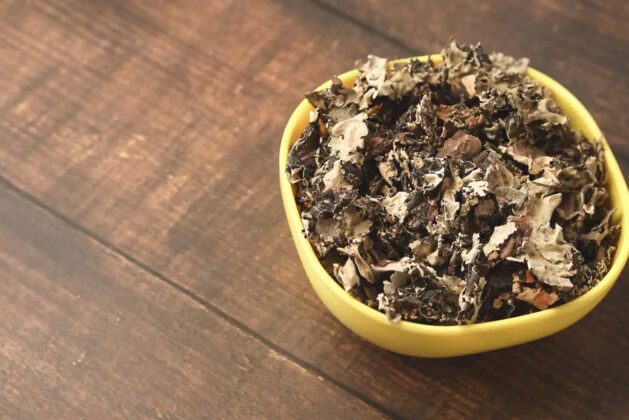[ad_1]
Stone flower or stone flower is a special Deccani spice. It is collected from rocks and then dried. It is used to make the gravy of both vegetarian and non-vegetarian dishes even more flavorful. In Kanker, women keep it mixed with spice powder. It is also used to flavor green vegetables, vegetables and lentils. But the special spice preferred in the Deccan and areas of South India is now being added to Marathi, East Indian and other cuisines as well. My mother also enhances the flavor of her cooking dishes with this spice these days. Tell us why this spice is so special.
In Maharashtra, the stone flower or chabeela is also known as day flower. Like any spice, the black flower is dried and added to a specially prepared Maharashtrian goda masala.
When stone flowers are picked and dried, they have neither scent nor taste. But when it is roasted in oil, it gives a wonderful aroma apart from the dagad flower. This is why things added with goda masala are roasted first and then mixed. When Dagad flowers are added, the spices become more fragrant.
What does ayurveda say about stone flower
According to Ayurveda, due to its diuretic property, calendula is useful in removing kidney stones by increasing urine production in the body. Stone flower powder is very effective for wound healing as it has antibacterial and anti-inflammatory properties.
Provides relief in urolithiasis
Urolithiasis is stones in the bladder and urinary tract. In Ayurveda it is known as Mutrashmari. Kidney stones are a condition of vata-kapha origin which causes blockage in the source of urine.

Stenblomst provides relief in urolithiasis due to its mitral (diuretic) property, which increases urine flow. The stone flower also helps balance kapha dosha, which further prevents the formation of kidney stones.
How to make stone flower decoction for urolithiasis
Take some stone flowers and grind them.
Mix it in 2 cups of water.
Cook for 10 to 15 minutes or until the mixture is reduced to .
Strain this decoction.
Consuming 10-15 ml of lukewarm decoction twice a day or as directed by the doctor provides rapid relief of the symptoms of urolithiasis.
Also prevents urinary tract infection (UTI)
Urinary tract infection (UTI) is described in Ayurveda as Mutrakrichantak. Urin means to ooze, Krichar means sore. Painful urination in this way is called Mutrachakra. This condition occurs due to imbalance between Vata and Kapha doshas. Stenblomst helps cure UTI due to its pungent, bitter and astringent properties. These properties help eradicate Kapha dosha, which in turn provides relief from urinary tract infections (UTIs).
asthma
The main doshas involved in asthma are Vata and Kapha. The polluted ‘Vata’ gets combined with ‘Kapha dosha’ in the lungs, causing obstruction of the airways. This causes difficulty breathing and wheezing sounds from the chest. This condition is known as respiratory disease (asthma). St. John’s wort helps manage asthma due to its kapha-vata balancing properties. These properties also help clear the blockage in the airways, making breathing easier.
You can use St. John’s wort as a spice in your diet to get relief from the symptoms of asthma.
Also read: turning 30? These 11 rules will help you be happy for years by relieving midlife stress
[ad_2]



Leave a comment